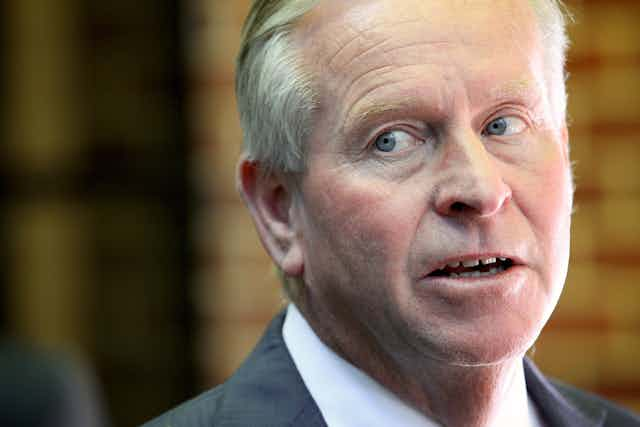Party leaders are critical to their party’s performance, and arguably have become even more so in an age in which voter loyalties have frayed and partisanship is on the wane.
It is for these reasons that a government’s electoral defeat is often the catalyst for vanquished premiers and prime ministers to stand aside from the leadership of their party and to quit the parliament.
This is not a legal or constitutional requirement, nor is it necessarily an expectation held by voters. Rather, it is more akin to an informal rule that is invoked following a government’s defeat so as to clear the path for the incoming leadership team.
The reasons why such a practice exist was recently brought into sharp focus when the former Western Australian premier, Colin Barnett, found himself at the centre of calls from the Liberals’ new leader, Mike Nahan, and some media commentators, to quit the parliament. Barnett rejected these suggestions.
Read more: Labor wins WA in a landslide as One Nation fails to land a blow
The question of whether a former premier has an obligation to resign depends in part on what one thinks the role of a political representative is, and to whom they owe their allegiance. For those who have sympathy for the partisan model of representation, former leaders should generally quit the parliament if this is what their party asks of them.
However, for those who subscribe to the view that elected representatives have obligations to the wider community (trustee model) or to the constituency that directly elected them (delegate model), then there is a much stronger case to be made for them serving out their full term, regardless of their former status within parliament.
The partisan model
The partisan model of representation would suggest that Barnett should quit the parliament, if this is desired by his party, in order to bring renewal within their ranks or help refocus the team following defeat.
This model positions the elected member as agents of the party, who owe a duty to their party because of the support they received and the opportunities that their party provided for them. Elected members are expected to place the party interest ahead of personal interests.
On these grounds, the Liberals have a strong case against Barnett remaining in parliament.
Barnett has not gone quietly into the night. Rather, he has caused the new leadership team embarrassment by arguing that his premiership was hamstrung by an under-performing second-term cabinet, some of whom remain in parliament.
Moreover, with the Liberals reduced to 13 members in a 59-seat chamber, and Barnett holding a safe seat, his exit would allow the party to refresh their ranks at a time when they are trying to rebuild.
Barnett the trustee?
If we treat Barnett as a trustee, then the logic favours that he should stay in parliament until such time as his conscience moves him to quit.
Under the trustee model, elected members are expected to be guided by their concern for the broader interests of the state. Once elected, the decision about how that member should serve these interests falls to the discretion of the member.
On this basis, Barnett can reasonably argue that he is an experienced legislator who still has much to contribute to the parliament and to the state.
Moreover, the high financial costs and general disruption associated with holding a byelection without proper cause is not advantageous to the people of the Western Australia.
An elected delegate
The delegate model requires the elected member to act according to the wishes of those who elected them. Unlike the trustee model, such assessments are not for the MP to make, but only after careful consideration of the views of the electorate.
Based on this model, only the voters in Barnett’s seat of Cottesloe are fit to make any such decision about his future and, arguably, they have already done so when they re-elected him in 2017.
Read more: It's unrealistic to expect MPs to follow the view of the people who elected them every time
Barnett’s claims in this regard are strengthened because he was elected on first preference votes (56.67%), and because he made clear his intention to remain in parliament regardless of the outcome of the election. This would suggest that Barnett’s electorate supported his reelection full in the knowledge of his future intentions.
Thus, in the absence of any actions that would render Barnett unfit or unable to serve under the WA Constitution, the logic of the delegate model supports his remaining in parliament.
The ultimate decision-maker
In the end, the decision about Barnett’s future in parliament is for him to make.
Neither the people of Cottesloe nor his own party can force him to resign. The Liberals can expel him from the party, but this does not solve the problem because what Barnett has said cannot be unsaid, and he may prove more of a distraction if freed from his partisan bonds.
Yet what this incident, and others similar to it underline, is that any such disagreement over whether former leaders should remain in parliament often boils down to different views about to whom they are ultimately beholden.

